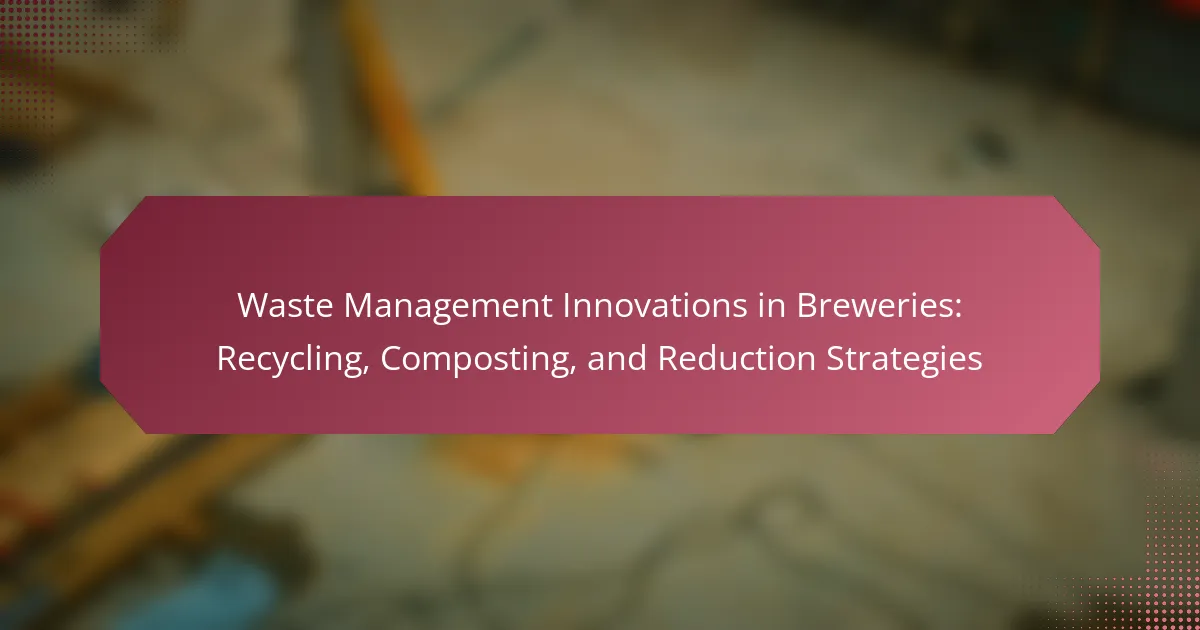Sustainable sourcing practices in the brewing industry focus on acquiring raw materials such as barley, hops, and water in an environmentally and socially responsible manner. These practices include sourcing from suppliers who prioritize sustainable farming, utilizing local ingredients to reduce transportation emissions, and obtaining certifications like organic or Fair Trade. The article highlights the benefits of sustainable sourcing, including increased brand loyalty among consumers and the importance of transparent supply chains to mitigate risks. It also discusses future trends such as the adoption of regenerative agriculture, sustainable packaging solutions, and the use of renewable energy in brewing operations, reflecting a growing commitment to responsible practices in the industry.

What are Sustainable Sourcing Practices in the Brewing Industry?
Sustainable sourcing practices in the brewing industry involve acquiring raw materials in an environmentally and socially responsible manner. This includes sourcing ingredients like barley, hops, and water from suppliers who prioritize sustainable farming methods. Practices may also encompass using local suppliers to reduce transportation emissions. Additionally, breweries often seek certifications such as organic or Fair Trade for their ingredients. These practices aim to minimize environmental impact and support local economies. Research indicates that sustainable sourcing can improve brand loyalty among consumers. A study by Nielsen shows that 66% of global consumers are willing to pay more for sustainable brands.
How do sustainable sourcing practices impact the brewing process?
Sustainable sourcing practices significantly enhance the brewing process. These practices ensure that raw materials are obtained in an environmentally friendly manner. This reduces the carbon footprint associated with transportation and production. Additionally, sustainable sourcing often involves using organic ingredients. Organic ingredients can improve the flavor profile of the final product.
Furthermore, sustainable practices promote biodiversity. They encourage the cultivation of various crops, which can lead to healthier ecosystems. Breweries that adopt these practices often experience increased consumer loyalty. This is due to a growing consumer preference for environmentally responsible brands.
Research indicates that breweries implementing sustainable sourcing see a reduction in operational costs over time. This is achieved through more efficient resource use and waste reduction. Overall, sustainable sourcing practices positively impact both the brewing process and the broader environment.
What raw materials are commonly sourced sustainably in brewing?
Barley, hops, water, and yeast are commonly sourced sustainably in brewing. Barley is often grown using organic farming methods. This reduces chemical pesticide usage and promotes soil health. Hops are also frequently sourced from farms that practice sustainable agriculture. These farms may utilize integrated pest management to minimize environmental impact. Water conservation practices are essential in breweries. Many breweries implement systems to recycle water during production. Yeast is cultivated through sustainable fermentation processes, often involving local strains. These practices contribute to a lower carbon footprint in brewing operations.
How does sustainable sourcing affect ingredient quality?
Sustainable sourcing enhances ingredient quality by promoting environmentally responsible farming practices. These practices often lead to healthier soil and ecosystems. Healthier soil improves nutrient availability for crops. This results in higher quality ingredients with better flavor profiles. Additionally, sustainable sourcing often emphasizes biodiversity. Increased biodiversity can lead to more resilient crops. Resilient crops are less susceptible to pests and diseases. This reduces the need for chemical inputs, further enhancing ingredient purity. Studies show that sustainably sourced ingredients often have superior taste and nutritional value compared to conventionally sourced ones.
Why are sustainable sourcing practices important for breweries?
Sustainable sourcing practices are important for breweries because they enhance environmental responsibility and resource efficiency. These practices reduce the carbon footprint associated with sourcing ingredients. Breweries that prioritize sustainability often attract environmentally conscious consumers. Additionally, sustainable sourcing can lead to cost savings in the long run. Studies show that sustainable practices can improve brand loyalty among consumers. For example, a Nielsen report indicates that 66% of global consumers are willing to pay more for sustainable brands. Implementing sustainable sourcing can also ensure a stable supply of raw materials. This stability is crucial in an industry that relies heavily on agricultural products. Overall, sustainable sourcing practices contribute to the long-term viability of breweries and the health of the planet.
What environmental benefits are associated with sustainable sourcing?
Sustainable sourcing significantly reduces environmental impact. It promotes biodiversity by ensuring that raw materials are harvested responsibly. This practice minimizes habitat destruction, protecting ecosystems and wildlife. Sustainable sourcing also lowers carbon emissions associated with transportation and production. By utilizing local suppliers, businesses can decrease their carbon footprint. Additionally, it encourages the use of renewable resources, fostering a circular economy. Studies show that companies practicing sustainable sourcing can reduce waste by up to 30%. This approach ultimately leads to healthier ecosystems and a more sustainable future.
How do sustainable practices enhance brand reputation in the brewing industry?
Sustainable practices enhance brand reputation in the brewing industry by demonstrating commitment to environmental responsibility. Breweries that adopt eco-friendly methods attract environmentally conscious consumers. This leads to increased customer loyalty and positive word-of-mouth. For instance, a 2020 survey found that 66% of consumers are willing to pay more for sustainable brands. Additionally, sustainable practices can reduce operational costs through energy efficiency. This financial benefit further strengthens a brewery’s market position. Brands recognized for sustainability often receive awards and media coverage, boosting visibility. Overall, engaging in sustainable practices effectively builds a stronger, more reputable brand in the brewing industry.
What challenges do breweries face in implementing sustainable sourcing?
Breweries face several challenges in implementing sustainable sourcing. One major challenge is the higher cost of sustainable materials compared to conventional options. This can strain budgets, especially for smaller breweries. Additionally, sourcing locally can limit availability and increase logistical complexities. Breweries may also encounter difficulties in establishing reliable relationships with sustainable suppliers. Another challenge is the lack of standardized definitions for sustainability, leading to confusion and inconsistency in sourcing practices. Compliance with regulations and certifications can add further complexity and require additional resources. Lastly, consumer demand for sustainable products may not always align with the brewery’s capacity to implement these practices effectively.
What are the financial implications of adopting sustainable sourcing practices?
Adopting sustainable sourcing practices can lead to significant financial implications for businesses. These practices often result in reduced costs through improved efficiency and waste reduction. Companies may experience lower energy and resource expenses over time. Sustainable sourcing can also enhance brand reputation, leading to increased customer loyalty and sales.
Research indicates that 66% of consumers are willing to pay more for sustainable brands. This willingness can translate into higher revenue for businesses that prioritize sustainability. Additionally, sustainable practices may attract investments, as investors increasingly prefer companies with strong environmental, social, and governance (ESG) criteria.
In some cases, initial costs may be higher due to the transition to sustainable suppliers. However, long-term savings often outweigh these initial investments. A study by McKinsey found that companies implementing sustainable practices can see profit margins improve by 10-20%.
Overall, the financial implications of adopting sustainable sourcing practices can be positive, leading to cost savings, increased sales, and enhanced investor interest.
How do supply chain complexities affect sustainable sourcing efforts?
Supply chain complexities significantly hinder sustainable sourcing efforts. These complexities include multiple tiers of suppliers, varying regulations, and logistical challenges. Each layer of the supply chain can introduce inefficiencies and increase costs. For instance, inconsistent quality from suppliers can lead to waste, undermining sustainability goals. Additionally, geographical dispersion of suppliers complicates transportation and increases carbon emissions. A study by the World Economic Forum found that 70% of companies struggle with supply chain transparency. This lack of transparency makes it difficult to ensure sustainable practices are followed throughout the supply chain. Consequently, companies may inadvertently source materials that do not meet sustainability criteria.

What solutions exist for overcoming challenges in sustainable sourcing?
Solutions for overcoming challenges in sustainable sourcing include implementing transparent supply chains. Transparency helps identify and mitigate risks associated with sourcing materials. Collaborating with suppliers ensures adherence to sustainability standards. This partnership can enhance resource efficiency and reduce environmental impact. Utilizing technology, such as blockchain, improves traceability in sourcing practices. Research shows that companies with transparent supply chains report higher consumer trust. Additionally, investing in sustainable materials can lead to long-term cost savings. Training and educating staff on sustainability practices fosters a culture of responsibility. These solutions collectively address the complexities of sustainable sourcing in the brewing industry.
How can breweries effectively implement sustainable sourcing strategies?
Breweries can effectively implement sustainable sourcing strategies by prioritizing local ingredients and establishing partnerships with sustainable farms. This reduces transportation emissions and supports local economies. Breweries should also seek certifications for sustainable practices, such as organic or fair trade, to ensure accountability. Engaging in transparent supply chain practices fosters trust with consumers. Additionally, breweries can invest in renewable energy sources for production processes, further minimizing their environmental impact. Implementing waste reduction strategies, like repurposing spent grains, contributes to sustainability efforts. According to the Brewers Association, 75% of craft breweries focus on sustainable sourcing, highlighting its growing importance in the industry.
What role does technology play in sustainable sourcing for breweries?
Technology plays a crucial role in sustainable sourcing for breweries. It enhances supply chain transparency and efficiency. Digital platforms allow breweries to track the origin of raw materials. This ensures that ingredients are sourced from sustainable farms. Advanced data analytics help breweries assess the environmental impact of their sourcing decisions. Technologies like blockchain provide immutable records for verifying sustainable practices. Automation in production reduces waste and energy consumption. IoT devices monitor resource usage in real time, promoting efficiency. These technological advancements contribute to a more sustainable brewing process.
How can partnerships enhance sustainable sourcing efforts?
Partnerships can enhance sustainable sourcing efforts by pooling resources and expertise. Collaborative initiatives enable companies to share best practices and innovative solutions. For instance, partnerships with local farmers can improve the quality and sustainability of raw materials. Such collaborations often lead to reduced transportation emissions and lower costs. Research shows that companies engaging in partnerships achieve higher sustainability ratings. According to a 2020 study by the World Resources Institute, businesses that collaborate on sustainability initiatives report a 30% increase in resource efficiency. These partnerships foster transparency and accountability in supply chains, further enhancing sustainability.
What best practices can breweries adopt for sustainable sourcing?
Breweries can adopt several best practices for sustainable sourcing. First, they should prioritize local ingredients. Sourcing from nearby farms reduces transportation emissions. Second, breweries can choose organic and sustainably grown raw materials. These practices minimize environmental impact and promote biodiversity. Third, they should establish long-term partnerships with suppliers. This fosters transparency and encourages sustainable farming practices. Fourth, breweries can implement a traceability system for their ingredients. Knowing the source helps ensure sustainable practices are being followed. Lastly, they should regularly assess and adapt their sourcing strategies. Continuous improvement in sustainability practices is essential for long-term success. These approaches not only benefit the environment but can also enhance brand reputation and customer loyalty.
How can breweries measure the success of their sustainable sourcing initiatives?
Breweries can measure the success of their sustainable sourcing initiatives through various metrics. They can track the percentage of ingredients sourced sustainably. This includes measuring the volume of local versus imported ingredients. Breweries can also assess the reduction in carbon footprint associated with sourcing. Monitoring waste reduction from sustainable practices is another key metric. Customer feedback and sales growth related to sustainable products provide insight into market acceptance. Conducting lifecycle assessments can quantify environmental impacts. Finally, obtaining certifications for sustainability can serve as a benchmark for success. These metrics collectively provide a comprehensive view of the effectiveness of sustainable sourcing initiatives.
What certifications should breweries look for in sustainable sourcing?
Breweries should look for certifications such as Organic, Fair Trade, and Rainforest Alliance in sustainable sourcing. Organic certification ensures that ingredients are grown without synthetic pesticides or fertilizers. Fair Trade certification guarantees that farmers receive fair compensation and adhere to sustainable practices. Rainforest Alliance certification focuses on biodiversity conservation and sustainable land management. These certifications help breweries demonstrate their commitment to sustainability. They also enhance brand reputation and consumer trust. Research indicates that consumers increasingly prefer products with recognized sustainability certifications.

What are the future trends in sustainable sourcing for the brewing industry?
Future trends in sustainable sourcing for the brewing industry include increased use of local ingredients. Breweries are focusing on sourcing grains, hops, and other materials from nearby farms. This reduces transportation emissions and supports local economies. Another trend is the adoption of regenerative agriculture practices. These practices improve soil health and biodiversity, which can enhance ingredient quality. Sustainable packaging solutions are also gaining traction. Breweries are moving towards recyclable and biodegradable materials to minimize waste. Additionally, the use of renewable energy sources in production is on the rise. This shift helps reduce the carbon footprint of brewing operations. Finally, transparency in supply chains is becoming essential. Consumers increasingly demand information about sourcing practices and sustainability efforts. These trends indicate a significant shift towards more responsible and sustainable practices in the brewing industry.
How is consumer demand shaping sustainable sourcing practices in brewing?
Consumer demand is driving breweries to adopt sustainable sourcing practices. Increased awareness of environmental issues influences consumers to prefer products with eco-friendly credentials. This shift in preference compels breweries to source ingredients responsibly. For instance, many breweries now prioritize local sourcing to reduce carbon footprints. Additionally, consumers are more inclined to support brands that demonstrate ethical sourcing. In response, breweries are investing in certifications like organic or fair trade. According to a 2021 survey by the Brewers Association, 65% of consumers consider sustainability when choosing beer brands. This trend is reshaping the brewing landscape towards more sustainable practices.
What innovations are emerging in sustainable sourcing for breweries?
Innovations in sustainable sourcing for breweries include the use of local ingredients, water conservation technologies, and renewable energy sources. Many breweries are sourcing grains and hops from nearby farms to reduce transportation emissions. Water management systems are being implemented to recycle and reduce water usage during brewing. Additionally, breweries are adopting solar and wind energy to power their operations. These practices not only lower the carbon footprint but also support local economies. A report by the Brewers Association highlights that 75% of craft breweries are now prioritizing sustainable sourcing initiatives. This shift reflects a growing trend towards environmental responsibility in the brewing industry.
What practical tips can breweries follow to enhance their sustainable sourcing practices?
Breweries can enhance their sustainable sourcing practices by prioritizing local ingredients. Sourcing from nearby farms reduces transportation emissions. It also supports local economies and fosters community relationships. Breweries should establish long-term partnerships with suppliers. This approach encourages sustainable farming practices among local growers.
Utilizing organic and regenerative agricultural products is another practical tip. These practices improve soil health and reduce chemical usage. Breweries can also implement a transparent supply chain. Transparency builds consumer trust and encourages responsible sourcing.
Investing in certifications like Fair Trade or Rainforest Alliance can enhance credibility. These certifications ensure adherence to sustainable practices. Finally, breweries should regularly assess their sourcing impact. Measuring sustainability metrics helps identify areas for improvement.
Sustainable sourcing practices in the brewing industry focus on acquiring raw materials such as barley, hops, and water in an environmentally and socially responsible manner. This article explores the benefits of sustainable sourcing, including improved ingredient quality, reduced environmental impact, and enhanced brand reputation, while also addressing challenges like higher costs and supply chain complexities. Solutions for overcoming these challenges, such as transparency in sourcing and establishing partnerships with local suppliers, will be examined. Additionally, the article highlights future trends, consumer demand influences, and practical tips for breweries to enhance their sustainable sourcing efforts, ultimately contributing to long-term viability and ecological health.



